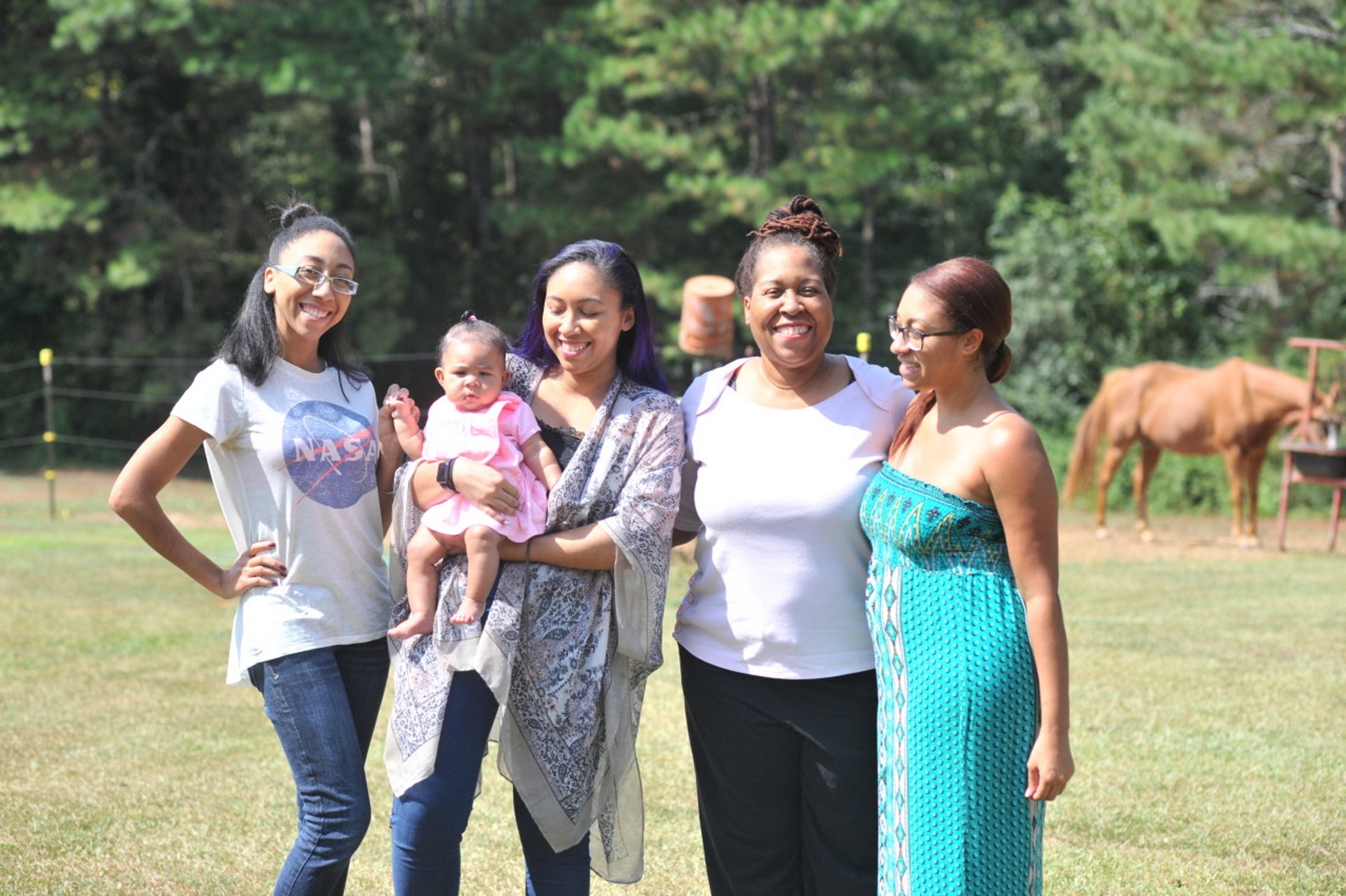Oconee County’s Young Female Farmers Changing Outlook Of Farming Industry

From left, Trae, Cheyenne holding Reese, Margo and Camaryn Candelario are shown. The three-generational, African-American farmers created their business, Young Female Farmers, in 2006. Not shown is Clarice Scott, whose garden launched the vision and the business.
Summer Evans / WABE
The Oconee County farm sits on top of several acres or the equivalent of three football fields. It overlooks a large pond full of bass, brim, crappies and catfish. As I walk over to the plush vegetable garden, two horses drink out of their water buckets.
It’s a tranquil place, but it has taken more than a decade for the women behind Young Female Farmers to get to this point of tranquility… and the journey hasn’t been easy.
The three-generational, African-American female farmers created their business back in 2006. It began with a garden by the grandmother, Clarice Scott, and grew into a full-fledged farm by her daughter Margo Candelario.
Candelario wanted to teach her daughters how to be self-sufficient and create their own business. They began to plant traditional vegetables like okra and cabbage, as well as kohlrabi and dinosaur kale. In the winter, they bake an array of pies, cakes and sweets to sell out of their home.
They have faced prejudices along the way — from the color of their skin, to their gender and age.
Each Saturday, the female farmers would set up a booth at a local farmers market with their fresh produce — and their smiles. The women began to notice a pattern of customers bypassing their booth for the white farmers.
Their mission to serve an underserved community was falling flat. Along with the sale of exotic veggies, they offered recipes and healthy techniques on how to cook them.
One of the third-generational farmers, Cheyenne Candelario, remembers how some customers didn’t believe she knew what she was talking about:
We would always get people who were older, black, white, brown who had an attitude, it seemed like, when younger people were explaining to them how to cook this particular vegetable.”
In the end, the recipes offered a bridge between the Young Female Farmers and their customers.
Margo was both a widow and a single mother and she wanted to do more than serve at local farmers markets. Her mission was to serve an underserved community (in the food deserts of Athens) with fresh produce and baked goods.
Two years ago, it dawned on her. She decided to mobilize the business with a cherry red concession-styled trailer. After 11 years serving the farmers markets, they hit the roads to be more accessible to underprivileged and impoverished communities.
The Young Female Farmers serve non-GMO and pesticide-free vegetables by using organic materials.
Today, the truck pops up in communities throughout the Oconee/Clark county area.
So I thought if I put kohlrabi on my truck and we go out into the community, I’m going to have a recipe on how to prepare it or I’m going to have a recipe on how to cook okra without frying it because you know in the South everyone fries everything.”
Margo Candelario, the second-generation farmer
The Candelario sisters have also been recognized by Food Tank in the Huffington Post. The farm was ranked No. 5 in its annual “30 Women Under 30” list.
What began as a garden by their grandmother, Clarice, has flourished into the growing business they have today.
You can visit their farm Wednesdays through Saturdays between 10 a.m. and 4 p.m. Their red trailer will be popping up again throughout the Athens area starting in June.
Adversity is something these African-American farmers will continually face in this industry, but Cheyenne has hope for the future, continuing with the fourth generation, 11-month-old Reese.















